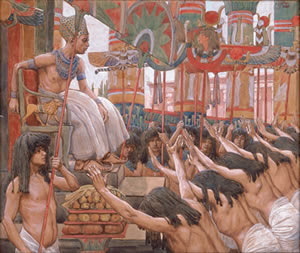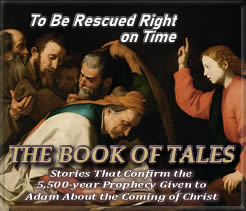Misconception #47 (Cont’d)
The Israelites were Always Slaves in Egypt Until Moses Led Them Out of Bondage
Just like every great misconception of The Bible, a great motion picture requires certain key elements; it needs a powerful story arc to be great. That means, in the case of the movie The Ten Commandments, the Israelites must begin in bondage en route to being released into freedom. Otherwise, without this clearly sequential storyline, the movie itself might fail to deliver on its own terms.
But the truth is: What works for Hollywood doesn’t necessarily work for Scripture. Cecil B. DeMille may have insisted that the Israelites start out as slaves, but God obviously had a different story arc in mind. And He did so because He had an entirely different purpose to reveal to mankind than Mr. DeMille did.
Completely ignoring Hollywood’s demands, the God of The Bible made sure that when the Israelites entered Egypt many years before the Exodus they were led by the cunning patriarch Jacob and his twelve sons.
Eventually, Jacob’s most gifted son, Joseph, ascended to a position of immense power as Egypt’s viceroy.
And Pharaoh said to his servants: “Can we find anyone to compare with Joseph, a man in whom the Spirit of God dwells so powerfully?”
Then Pharaoh said to Joseph: “Because God has shown you so much, there’s no one as clever and wise as you. Therefore, you’ll rule over all my people. Only my throne will be greater than yours. Today, I’ve established you over the whole of Egypt.”
And Pharaoh took off the ring from his hand, and put it on Joseph’s finger. Arraying him in royal clothing made of fine linen, he placed a gold chain around his neck. And Pharaoh had Joseph seated in the second chariot, which rode next to him, and the people cried out to him: “Bow your knee, Pharaoh has made Joseph to be ruler over all the land of Egypt.”
Story Continues Below
Says Richard Price—the founder and CEO of Academia.edu—on his podcast In Depth With Academia:
Fish Tales (From the Belly of the Whale): Fifty of the Greatest Misconceptions Ever Blamed on The Bible is:
To hear Price’s book review of Fish Tales (From the Belly of the Whale), CLICK HERE.
To hear Kent and Zen Garcia talk about correcting biblical misconceptions, from June 23rd, 2021, CLICK BELOW.
Story Continues From Above
It was through Joseph’s authority, then, that the Israelites became beneficiaries of the most fertile sections of the country, wielding untold influence over the land and its people. So began a new phase in Egyptian history, where one man and his family grew into a coalition of shepherd-kings, which eventually achieved the kind of greatness generally attributed only to gods and goddesses.
During Joseph’s reign in Egypt, the number of those from the line of Jacob who entered the land was just seventy people, but over time, the Israelites increased to such an extent that they multiplied and grew into a powerful nation, filling the entire land with their people.
Eventually, however, Joseph died, along with his brothers and his entire generation, and one day, a new Pharaoh rose up in Egypt who scorned the memory of Joseph and his deeds. He said, “Just look at all these Israelites. They’re greater and more plentiful than we are. Come, let’s deal wisely with them, or else they’ll keep multiplying, and someday, if a war ever breaks out, they’ll join with our enemies and turn against us. So let’s get rid of them, once and for all.”
Within little more than a generation, their vengeful plan had succeeded beyond their wildest dreams, reducing the once-powerful coalition of shepherd-kings into a scattered, disintegrated rabble.
Flash forward many generations, and it’s now as though the Israelites had always been slaves in Egypt. And so they remained in that dismal state until God raised up one of the most famous of all messianic figures, Moses, who galvanized this beleaguered bunch into a group that was finally ready to recapture the dignity that had been stolen from them so long ago.
There you have it, then. What a subtle yet critical distinction. The question, however: Is it really a distinction that matters?
Well, it matters if one cares about what The Bible is trying to accomplish. It matters when you consider the Scriptures are designed to reveal God’s intention toward mankind, which in turn reveals what our attitude toward God should be. As such, an understanding of all that pertains to the slavery of these Israelites and their emancipation from Egypt is something of paramount importance.It’s important because whenever someone watches a movie about God’s control over history, which is what The Ten Commandments is about, questions inevitably come to mind: What forces conspired to reduce the Israelites to this miserable condition? If God was as concerned about them as the movie purports, why did He just stand by as they sank into slavery? And finally, if He was capable of the miracles depicted in the last half of the film, why did He wait so long to perform them?
Only when we look to the context of The Bible do we find the answer to such questions. Far from portraying God as having abandoned His people through a lack of concern for them, the Scriptures reveal He was actually working out a much larger plan. As such, the plan of human redemption was never something that could be embraced within the length of a single lifetime. Rather, it’s a plan that’s been unfolding throughout the entire span of biblical history. That’s because the Israelites in Egypt weren’t the only ones that God was concerned about; He was working toward rescuing humanity on a global scale. In other words, God’s plan doesn’t touch upon just one point in time, as it was perceived by Israel of old, but throughout all time, as it’s perceived by every son and daughter of faith.







